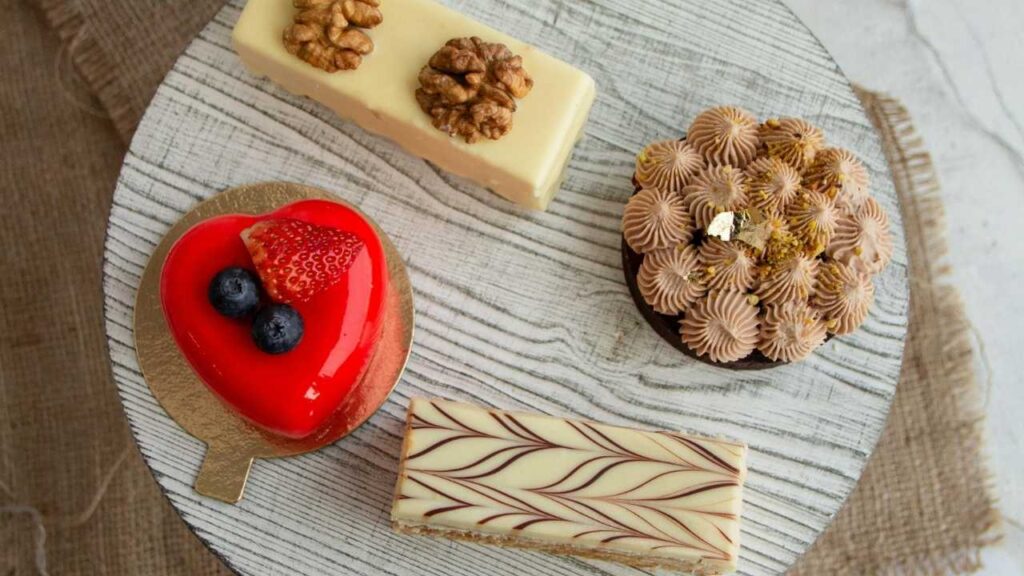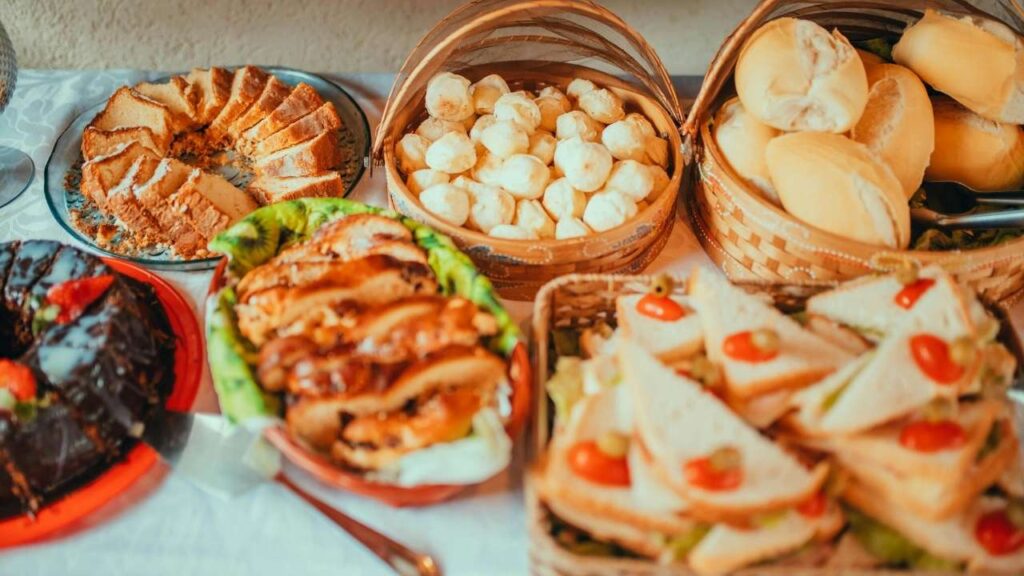Don’t worry about the bland, dull loaves that clutter grocery store shelves. Artisanal bakes are starting a wonderful revolution that is spreading over the world from ovens. People want their food to taste good, be authentic, and have a connection to them. You need these handmade things, like crusty sourdough bread, airy croissants, or rich pastries. Artisanal baked products are more than simply food; they’re an experience. They are made using the best ingredients, careful attention to detail, and time. They convey a narrative of love, expertise, and tradition. Our senses are awakened by these delicacies in a manner that factory-produced food cannot. The buttery layers of a kouign-amann and the crunchy baguette are two examples. Let’s find out why these tasty snacks are loved all across the world.

What Defines True Artisanal Bakes?
So, what does it imply when a cake is “made by hand”? It’s not simply a cool name. There is philosophy and practice to real artisanal baking. First, the number of batches is crucial; they are normally created by one baker or a small group of bakers. This helps you pay great attention to every stage and detail. The second most important thing is technique. Artisans utilise methods that have worked for a long time, such lengthy fermentation for sourdough, hand-laminating dough for viennoiserie or shaping loaves by touch. Third, we don’t know how well the parts work together. Use fruits that are in season, cereals that are farmed nearby, European-style butter, and sweets that haven’t been processed. In commercial baking, the goals are speed and how long the food will last. In this case, the goals are flavour texture, and skill.
The Magic of Time & Tradition in Artisan Baking
In artisan baking, patience isn’t simply a good quality; it’s the secret ingredient. In artisanal baking, you usually can’t speed up the stages. Natural sourdough starters can ferment for longer than 24 hours. This makes them taste better and gives your stomach beneficial bacteria. You need to fold and chill croissant dough many times to make hundreds of little layers. Fruit fillings cook gently so that their aromas come out. This concern for time connects modern artisanal baked goods to ones that have been around for hundreds of years. Bakers learn skills that have been passed down through the years, including how to keep a beginning alive for decades or how to make the crust of a baguette crackle just so. What happened? Depth and character you can taste.
Why Your Taste Buds Love Artisanal Bakes
Have you ever thought about why the muffins from your local bakery taste better than the ones in a box? It’s because of science and ambition. Artisan bakers employ natural ways to make their bread taste better. Fermentation breaks down gluten and carbohydrates over time, which makes the flavours more interesting (such sweet, nutty, or sour) and makes it simpler to digest. Butter and olive oil are two examples of high-quality fats that provide taste. Fresh seasonal and local meals taste the finest. A summer peach galette is full of freshness that no manufactured puree can equal. Texture also gets a lot of attention, with a crunchy crust, an airy crumb, or a buttery taste that melts in your tongue. Every bite has layers, is balanced, and is incredibly pleasant.

The Unexpected Range of Handmade Goods Artisanal Bakes
Sourdough is the most well-known artisanal bread, but there are many more types that are just as wonderful. You may try the buttery, caramelised kouign-amann from Brittany, the delicate French macarons in seasonal flavours, or the flaky spanakopita filled with fresh greens. You may also obtain savoury meals like hand-folded Cornish pasties, focaccia with rosemary and sea salt, or Turkish menu stuffed with cheese. There are many areas in the globe that have the greatest food, such as Japanese melon pan that is soft and Mexican conchas that are spicy. They even utilise high-quality chocolate, nuts, and other creative touches to make cookies and brownies. The baker’s distinct approach comes through in the many different ways people from all around the world celebrate.
Finding Genuine Artisanal Bakes Near You
Want to buy actual baked products that were created by hand? Don’t go to the section with frozen food. Start with bakeries in your area and seek for places where you can see the items being created. Some signs are small daily batches, detailed ingredient listings (such as “local wheat” and “grass-fed butter”), and bakers who are happy to talk about how they make their goods. You can find passionate small-batch makers at farmers’ markets. Online listings like Yelp and specialty food apps usually showcase real craftspeople. Check out social media: bakers who are happy with their work frequently show off how they do it, including how they prepare sourdough starters, shape dough by hand, or utilise wood-fired ovens.Ask away! If they talk excitedly about how long it takes to ferment or where the flour comes from, you’ve discovered the real thing.
The Joy of Creating Your Own Artisanal Bakes at Home
You don’t need a fancy kitchen to make tasty baked items. Begin with something simple: Mix flour and water together to form a sourdough starter.. It’s like a pet that creates bread! For rustic loaves, let a no-knead dough sit overnight. Try making laminated dough with rough puff pastry.It looks good and is simple to use. Put quality first: Even if it costs a little extra, buy good butter, organic wheat, and fruit that is in season. Accept faults; a galette that isn’t precisely spherical is lovely. There are a lot of resources: Online courses, community baking clubs, and easy-to-follow cookbooks make procedures easier to understand. The process slows you down, connects you to the origins of food, and gives you something that is completely yours—the core of artisanal spirit.

The Future Looks Delicious, Artisanal Bakes on the Rise
The artisanal baking movement is getting smarter and more open to everyone. Expect hyper-localization, with bakeries working directly with adjacent grain farmers to make special flour mixes. Think of using recycled ingredients (such wasted grain from brewers) and without wasting anything. Gluten-free sourdough or vegan pastries made with creative nut butters are great for those with dietary restrictions. Technology also helps tradition. For example, applications may help you keep track of fermentation, and online workshops can unite bakers from all over the world. What is the most interesting? A new group of bakers is using both old and modern ways to make sure that artisanal baked delicacies stay fresh, simple to find, and totally delicious for years to come. Enjoy the craft, one bite at a time.
What is the difference between baking for business and baking for fun?
| Key Aspect | Artisanal Bakes 🍞✨ | Commercial Bakes 🏭📦 |
| Production Scale | Small batches (usually less than 50 things per day) made by expert bakers in their own homes. | Every day, machines in factories work together to make hundreds of things. |
| Ingredients | The parts are entirely real: high-quality local or specialty flours, butter from cows who graze grass, and fruits that are in season. | Cheap made flours, vegetable shortening, shelf-stabilizers, and artificial flavours. |
| Time spent | Fermentation that lasts a long time (24 to 72 hours), hand-layering, and cold breaks all help the taste develop on its own. | rapid proofs (1–2 hours) and rapid rising agents—speed over depth. |
| Taste and Feel | A buttery richness with a lot of acidity and nuttiness, as well as crisp crusts and light, irregular crumbs. | The taste is always light, the crusts are softer, the texture is thick and smooth, and the mouthfeel is waxy. |
| Variety & Creativity | Seasonal changes 🍓, local specialities (such heirloom grain breads), and the chef’s mood. | Menus that don’t change often, only seasonal changes, and foods that most people like. |
| Eating and Digestion | Fermentation that happens on its own makes probiotics stronger and breaks down gluten, which is good for your stomach. | Additives and preservatives can fill you up, and they are also quite processed. |
| Shelf Life | vatives) – honours newness. Best in 24 to 48 hours (no pressure | Weeks-long shelf stability (chemical extenders) puts convenience first. |
| Sustainability | Helps local farmers 🌱, uses less packaging, and finds inventive ways to use “ugly” items. | Long supply chains, packaging that is laden with plastic, and rules on how to handle garbage. |
| Experience | Story-driven: Bakers talk about where their flour comes from and how they use it. Every object feels different. | Transactional: always the same, but not personal. No link to the manufacturer or the procedure. |

Why Artisanal Bread and Pastries are More Than Just Food
Artisanal bakes are a strong return to eating mindfully. They chat about how excellent the farmer’s produce is, how good the baker is at his profession, and how lovely it is to enjoy good food with other people. When you buy a baked bread or pastry, you’re not only voting for taste; you’re also voting for community, sustainability, and keeping culinary history alive. Stop the next time you eat a Danish with fruit in it or a crusty sourdough. Thank the person who created it for using high-quality ingredients and putting in the time and effort to do a good job. You may make these delights at home or buy them from a bakery in your area. They’re wonderful for more than just your health.
FAQ’s
1. What is an artisanal baker?
A skilled craftsperson who bakes with passion, focusing on traditional methods and high-quality ingredients.
2. What does “artisanal” mean in baking?
It emphasizes craftsmanship over mass production, using time-tested techniques for superior breads, pastries, and cakes.
3. What are artisan bakes?
Handcrafted goods made with care, premium ingredients, and often locally sourced materials for exceptional flavor and texture.
4. What is an artisanal cake?
A dessert made using traditional, non-mechanized methods and top-tier ingredients for a distinct, high-quality result.
5. How much do artisan bakers earn?
Hourly wages range from £12-£14, while annual salaries typically fall between £21,000-£35,000, depending on role and experience.



